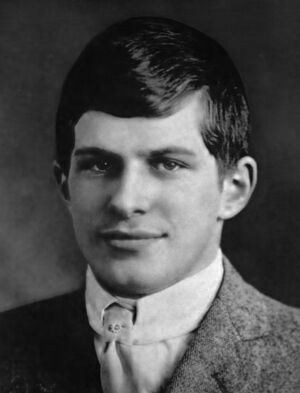William James Sidis (nonfiction): Difference between revisions
(Created page with "thumb|William James Siddis (1914).'''William James Sidis''' (/ˈsaɪ dɪs/; April 1, 1898 – July 17, 1944) was an American child prodig...") |
No edit summary |
||
| (2 intermediate revisions by the same user not shown) | |||
| Line 1: | Line 1: | ||
[[File:William_James_Sidis_1914.jpg|thumb|William James Siddis (1914).]]'''William James Sidis''' (/ˈsaɪ dɪs/; April 1, 1898 – July 17, 1944) was an American child prodigy with exceptional mathematical abilities and a claimed mastery of many languages. | [[File:William_James_Sidis_1914.jpg|thumb|William James Siddis (1914).]]'''William James Sidis''' (/ˈsaɪ dɪs/; April 1, 1898 – July 17, 1944) was an American child prodigy with exceptional mathematical abilities and a claimed mastery of many languages. Sidis became famous first for his precocity and later for his eccentricity and withdrawal from public life. | ||
Sidis could read ''The New York Times'' at 18 months. By age 8, he had reportedly taught himself 8 languages (Latin, Greek, French, Russian, German, Hebrew, Turkish, and Armenian) and invented another, which he called Vendergood. | |||
Sidis set a record in 1909 by becoming the youngest person to enroll at Harvard University. In early 1910, Sidis' mastery of higher mathematics was such that he lectured the Harvard Mathematical Club on four-dimensional bodies. Sidis began taking a full-time course load in 1910 and earned his Bachelor of Arts degree, ''cum laude'', on June 18, 1914, at age 16. Another child prodigy, cybernetics pioneer [[Norbert Wiener (nonfiction)|Norbert Wiener]], also attended Harvard at the time and knew Sidis. | |||
Eventually, he avoided mathematics altogether, writing on other subjects under a number of pseudonyms. | |||
After his death, his sister made the unverifiable claim that his IQ was "the very highest that had ever been obtained", but any records of any IQ testing that Sidis actually took have been lost to history. | After his death, his sister made the unverifiable claim that his IQ was "the very highest that had ever been obtained", but any records of any IQ testing that Sidis actually took have been lost to history. | ||
Some of the claims Sidris made were exaggerations, with a researcher stating "I have been researching the veracity of primary sources of various subjects for about twenty-eight years, and never before have I found a topic so satiated with lies, myths, half-truths, exaggerations, and other forms of misinformation as is in the history behind William Sidis". | |||
== In the News == | == In the News == | ||
| Line 13: | Line 17: | ||
== Fiction cross-reference == | == Fiction cross-reference == | ||
* [[Crimes against mathematical constants]] | |||
* [[Gnomon algorithm]] | |||
* [[Gnomon Chronicles]] | |||
* [[Mathematician]] | |||
* [[Mathematics]] | |||
== Nonfiction cross-reference == | == Nonfiction cross-reference == | ||
* [[Mathematician (nonfiction)]] | |||
* [[Mathematics (nonfiction)]] | * [[Mathematics (nonfiction)]] | ||
* [[Norbert Wiener (nonfiction)]] | |||
External links: | External links: | ||
* [https://en.wikipedia.org/wiki/William_James_Sidis William James Siddis] @ Wikipedia | * [https://en.wikipedia.org/wiki/William_James_Sidis William James Siddis] @ Wikipedia | ||
* [https://boingboing.net/2019/03/25/vendergood-peridromophiliac.html The works of William James Sidis, the "smartest man who ever lived"] @ Boing Boing | |||
[[Category:Nonfiction (nonfiction)]] | [[Category:Nonfiction (nonfiction)]] | ||
[[Category:Mathematicians (nonfiction)]] | [[Category:Mathematicians (nonfiction)]] | ||
[[Category:People (nonfiction)]] | [[Category:People (nonfiction)]] | ||
Latest revision as of 06:36, 25 March 2019
William James Sidis (/ˈsaɪ dɪs/; April 1, 1898 – July 17, 1944) was an American child prodigy with exceptional mathematical abilities and a claimed mastery of many languages. Sidis became famous first for his precocity and later for his eccentricity and withdrawal from public life.
Sidis could read The New York Times at 18 months. By age 8, he had reportedly taught himself 8 languages (Latin, Greek, French, Russian, German, Hebrew, Turkish, and Armenian) and invented another, which he called Vendergood.
Sidis set a record in 1909 by becoming the youngest person to enroll at Harvard University. In early 1910, Sidis' mastery of higher mathematics was such that he lectured the Harvard Mathematical Club on four-dimensional bodies. Sidis began taking a full-time course load in 1910 and earned his Bachelor of Arts degree, cum laude, on June 18, 1914, at age 16. Another child prodigy, cybernetics pioneer Norbert Wiener, also attended Harvard at the time and knew Sidis.
Eventually, he avoided mathematics altogether, writing on other subjects under a number of pseudonyms.
After his death, his sister made the unverifiable claim that his IQ was "the very highest that had ever been obtained", but any records of any IQ testing that Sidis actually took have been lost to history.
Some of the claims Sidris made were exaggerations, with a researcher stating "I have been researching the veracity of primary sources of various subjects for about twenty-eight years, and never before have I found a topic so satiated with lies, myths, half-truths, exaggerations, and other forms of misinformation as is in the history behind William Sidis".
In the News
Fiction cross-reference
Nonfiction cross-reference
External links:
- William James Siddis @ Wikipedia
- The works of William James Sidis, the "smartest man who ever lived" @ Boing Boing
